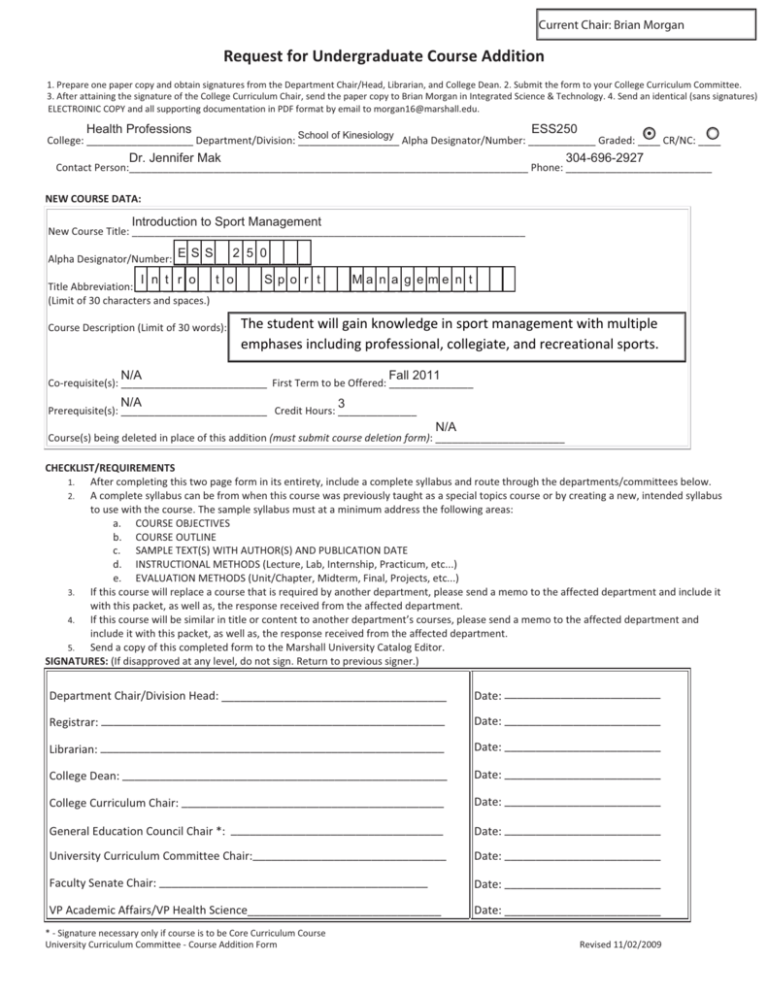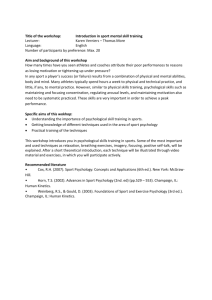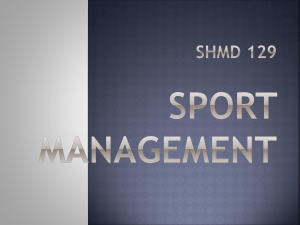ESS250 - Intro to Sport Management
advertisement

Current Chair: Brian Morgan RequestforUndergraduateCourseAddition 1. Prepare one paper copy and obtain signatures from the Department Chair/Head, Librarian, and College Dean. 2. Submit the form to your College Curriculum Committee. 3. After attaining the signature of the College Curriculum Chair, send the paper copy to in ! "#$. 4. Send an identical (sans signatures) ELECTROINIC COPY and all supporting documentation in PDF format by email to %@marshall.edu. Health Professions ESS250 School of Kinesiology College:___________________Department/Division:__________________AlphaDesignator/Number:____________Graded:____CR/NC:____ Dr. Jennifer Mak 304-696-2927 ContactPerson:_______________________________________________________________________Phone:__________________________ NEWCOURSEDATA: Introduction to Sport Management NewCourseTitle:______________________________________________________________________ E S S 2 5 0 AlphaDesignator/Number:____________________ I n t r o t o S p o r t Ma n a g eme n t TitleAbbreviation:__________________________________________________ (Limitof30characters andspaces.) CourseDescription(Limitof30words): The student will gain knowledge in sport management with multiple emphases including professional, collegiate, and recreational sports. N/A Fall 2011 Corequisite(s):__________________________FirstTermtobeOffered:_______________ N/A 3 Prerequisite(s):__________________________CreditHours:______________ N/A Course(s)beingdeletedinplaceofthisaddition(mustsubmitcoursedeletionform):_______________________ CHECKLIST/REQUIREMENTS 1. Aftercompletingthistwopageforminitsentirety,includeacompletesyllabusandroutethroughthedepartments/committeesbelow. 2. Acompletesyllabuscanbefromwhenthiscoursewaspreviouslytaughtasaspecialtopicscourseorbycreatinganew,intendedsyllabus tousewiththecourse.Thesamplesyllabusmustataminimumaddressthefollowingareas: a. COURSEOBJECTIVES b. COURSEOUTLINE c. SAMPLETEXT(S)WITHAUTHOR(S)ANDPUBLICATIONDATE d. INSTRUCTIONALMETHODS(Lecture,Lab,Internship,Practicum,etc...) e. EVALUATIONMETHODS(Unit/Chapter,Midterm,Final,Projects,etc...) 3. Ifthiscoursewillreplaceacoursethatisrequiredbyanotherdepartment,pleasesendamemototheaffecteddepartmentandincludeit withthispacket,aswellas,theresponsereceivedfromtheaffecteddepartment. 4. Ifthiscoursewillbesimilarintitleorcontenttoanotherdepartment’scourses,pleasesendamemototheaffecteddepartmentand includeitwiththispacket,aswellas,theresponsereceivedfromtheaffecteddepartment. 5. SendacopyofthiscompletedformtotheMarshallUniversityCatalogEditor. SIGNATURES:(Ifdisapprovedatanylevel,donotsign.Returntoprevioussigner.) DepartmentChair/DivisionHead:____________________________________ Registrar:_______________________________________________________ Librarian: _______________________________________________________ CollegeDean: ____________________________________________________ CollegeCurriculumChair: __________________________________________ &' $* __________________________________ UniversityCurriculumCommitteeChair:_______________________________ FacultySenateChair:___________________________________________ VPAcademicAffairs/VPHealthScience_______________________________ Date:_________________________ Date:_________________________ Date: _________________________ Date: _________________________ Date: _________________________ Date: _________________________ Date: _________________________ Date:_________________________ Date:_________________________ Revised/0/2009 RequestforUndergraduateCourseAdditionPage2 AdditionalInformationRequiredforUndergraduateCourseAddition Health Professions School of Kinesiology ESS250 College:_______________________Department/Division:___________________________AlphaDesignator/Number:__________________ Providecompleteinformationregardingthenewcourseadditionforeachtopiclistedbelow.Beforerouting thisform,acompletesyllabusalsomustbeattachedaddressingtheitemslistedonthefirstpageofthisform. 1.Identifybynamethefacultyinyourdepartment/divisionwhomayteachthiscourse. Dr. Jennifer Mak or Dr. Jarrod Schenewark 2.Ifyourdepartment/divisionrequiresadditionalfaculty,equipment,orspecializedmaterials,attachan estimationofmoneyandtimerequiredtosecuretheseitems. no additional equipment needed 3.Ifthiscoursewillberequiredbyadepartment/divisionotherthanyourown,identifybyname. No additional department/division required this course. 4.Ifthereareanyagreementsrequiredtoprovideclinicalexperience,attachdetailsandsignedagreements. No clinical experience are required in this course 5.Iflibraryresourcesaredeemedinadequate,attachaplantoovercomethis.Theplanmustincludethecost asstatedbytheDeanofLibraries. No additional library resources are needed 6.EQUIPMENT/SUPPLIESNEEDEDTOTEACHTHISCOURSE(thisdoesnotrefertoadditional equipment/suppliesthatneedtobepurchased;simplywhatmaterialsareneededinordertoteachthis coursesuccessfully.): Regular Classroom with LCD projector and computer etc. 7.ADDITIONALGRADUATEREQUIREMENTSIFLISTEDASANUNDERGRADUATEOR GRADUATECOURSE(pleasealsosubmittoGraduateCouncilcourseadditionfor5xxgraduatecomponent): This course is only for undergraduate students. It is not a graduate course 8.PROVIDEACOMPLETEBIBLIOGRAPHYINCLUDINGALLPUBLICATIONSRESEARCHEDTOCREATETHIS COURSEANDWHATPUBLICATIONSMAYBEBENEFICIALTOSTUDENTSTAKINGTHISCOURSE(separate page). UniversityCurriculumCommittee–CourseAdditionForm Revised+-/2--6 BIBLIOGRAPHY: Fried, G. (2009). Managing Sport Facilities (2nd ed). Champaign, IL: Human Kinetics. Fried, G., Shapiro, S., & Deschriver, T.D. (2007). Sport Finance (2nd ed.). Champaign, IL: Human Kinetics. Gillentine, A., & Crow, B.R. (2009). Foundations of Sport Management (2nd ed.). Sport Management Library. Hoye, R., Smith, A., Nicholson, M., Stewart, B., & Westerbeek, H. (2009). Sport Management: Principles and Applications, Volume 1, (2nd ed.). Portsmouth, NH: Butterworth-Heinemann Publications. Krotee, M., & Bucher, C. (2006). Management of Physical Education and Sport (13th ed.). Columbus, OH: McGrawHill Publishing. Lussier, R., & Kimball, D. (2009). Applied Sport Management Skills. Champaign, IL: Human Kinetics. Masteralexis, L., Barr, C., & Hums, M. (2011). Principles and Practice of Sport. Sudbury, MA: Jones and Bartlett Learning Parkerhouse, B.L. (2004). The Management of Sport: Its Foundation and Application (4th ed). Columbus, OH: McGraw-Hill Publishing. Page 1 of 1 Sport Management and Marketing Program MARSHALL UNIVERSITY Huntington, West Virginia ESS 250: INTRODUCTION TO SPORT MANAGEMENT 3 Credits SAMPLE SYLLABUS Meeting Times: Classroom: Instructor Name: Instructor Office: Instructor Phone: Instructor Email: Instructor Office Hours: Instructor Address: 1. Tue/Thur 11:00-12:15 pm GH 120 Dr. Jennifer Mak, Professor and Director of Sport Management Program GH 107A 696-2927 mak@marshall.edu Tuesday 1:30pm to 4:30pm Thursday 1:30pm to 4:30pm Any by Appointment Marshall University, School of Kinesiology One John Marshall Drive, GH107-A, Huntington, WV 25755-2450 TEXT BOOKS: Pedersen, P.M., Parks, J.B., Quarterman, J., & Thibault, L. (2010). Contemporary Sport Management (4th ed.). Champaign, IL: Human Kinetics. (Required) 2. COURSE DESCRIPTION: A study of sport management as an academic major and as a professional endeavor. 3. PRE-REQUISITE: N/A 4. ATTENDANCE POLICY: Full (100%) attendance at all classes is expected. To be “Excused,” absences must be communicated to the instructor in advance, or as soon as reasonably possible in the case of an emergency. Class participation grade will be based on student attendance and quality of participation. 5. GRADING POLICY: A B C D F Points 495-550 440-494 385-439 330-384 below 330 EXCELLENT, Achievement with Distinction VERY GOOD, Superior Work! AVERAGE, Satisfactory Work. BELOW AVERAGE, Poor but passing FAILURE Content “UNDERSTAND, WE HAVE HIGH EXPECTATIONS!” Points Class Participations Quizzes Discussions Exams 45 65 40 400 Page 1 of 4 6. STUDENT LEARNING OUTCOMES: After completion of the class, students should be able to Upon completion of this course, students will be able to Define sport management and discuss the nature and scope of opportunities in the sport industry Explain the importance of a professional perspective Identify the major business and market structures that allowed people to develop various sport businesses over the past 150 years Define, explain, and discuss the development of professional sport Demonstrate an understanding of the events surrounding the development of intercollegiate athletics Explain the differing critical views of that role that interscholastic athletics plays in society Explain key challenges in managing youth and community sport and propose solutions for those challenges Describe the intersection between sport and tourism Describe how sports are distributed to consumers Explain the definition and theoretical elements of sport communication Explain the concept of economic impact analysis and its relationship to sport events and facilities Describe the necessary steps in managing a facility 7. Each student learning outcome will be assessed in the following manner: Discussions; Quizzes; Exams Discussions; Quizzes; Exams Discussions; Quizzes; Exams Discussions; Quizzes; Exams Discussions; Quizzes; Exams Discussions; Quizzes; Exams Discussions; Quizzes; Exams Discussions; Quizzes; Exams Discussions; Quizzes; Exams Discussions; Quizzes; Exams Discussions; Quizzes; Exams Discussions; Quizzes; Exams ACADEMIC HONESTY: Any act of a dishonorable nature which gives the student engaged in it an unfair advantage over others engaged in the same or similar course of study and which, if known to the instructor in such course of study, would be prohibited. This shall include, but is not limited to, the following: securing or giving unfair assistance of any type of required work; submitting as one's own work or creation any oral, graphic, or written material wholly or in part created by another; altering of any grade or other academic record; and any other type of misconduct or activity which manifests dishonesty or unfairness in academic work. If you have any question please refer to the latest version of the Undergraduate Catalog on Marshall University Website or your student handbook. 8. POLICY FOR STUDENTS WITH DISABILITIES: Marshall University is committed to equal opportunity in education for all students, including those with physical, learning and psychological disabilities. University policy states that it is the responsibility of students with disabilities to contact the Office of Disabled Student Services (DSS) in Prichard Hall 117, phone 304 696-2271 to provide documentation of their disability. Following this, the DSS Coordinator will send a letter to each of the student’s instructors outlining the academic accommodation he/she will need to ensure equality in classroom experiences, outside assignment, testing and grading. The instructor and student will meet to discuss how the accommodation(s) requested will be provided. For more information, please visit http://www.marshall.edu/disabled or contact Disabled Student Services Office at Prichard Hall 11, phone 304-696-2271. 9. UNIVERSITY COMPUTING SERVICES’ ACCEPTABLE USE POLICY: All students are responsible for knowing this policy, which can be found on the web at http://www.marshall.edu/ucs/CS/accptuse.asp. Page 2 of 4 10. AFFIRMATIVE ACTION POLICY: This course will follow Marshall University’s policy on Affirmative Action, which can be found on pp. 63 of the 20102011 undergraduate catalog at: http://www.marshall.edu/catalog/undergraduate/ug_10-11_published.pdf, or on pp. 37 of the 2010 graduate catalog http://www.marshall.edu/catalog/Graduate/F2010/Gr_10-11_published.pdf. Specifically, all students will be afforded equal opportunity without regard to race, color, sex, religion, age, disability, national origin, or sexual orientation. 11. INCLEMENT WEATHER POLICY: Students can find information concerning Marshall’s policy regarding inclement weather on pp. 64 of the 2010-2011 undergraduate online catalog at: http://www.marshall.edu/catalog/undergraduate/ug_10-11_published.pdf, or on pp. 38 of the 2010-2011 graduate catalog http://www.marshall.edu/catalog/Graduate/F2010/Gr_10-11_published.pdf. The College of Education and Human Services has made a commitment to social justice. No one will be discriminated against on the bases of race, sex, ethnicity, age, sexual orientation, social class, abilities, or differing viewpoints. Each student will be viewed as a valuable part of this class. 12. SCHEDULE: Date Content Week 1 Managing Sport in the 21st Century Week 2 Developing a Professional Perspective Week 3 Historical Aspects of the Business Industry Week 4 Exam I Review Professional Sport Week 5 Professional Sport EXAM #1 Week 6 Intercollegiate Athletics Week 7 Interscholastic Athletics Week 8 Youth and Community Sport Week 9 Exam II Review Sport Management and Marketing Agencies Week 10 Sport Management and Marketing Agencies EXAM #2 Week 11 Sport Tourism Week 12 Exam III Review Sport Marketing Week 13 Sport Marketing EXAM #3 Week 14 Communication in Sport Industry Week 15 Finance and Economics in the Sport Industry Week 16 Sport Facility and Event Management Final Exam Review Page 3 of 4 13. BIBLIOGRAPHY: Fried, G. (2009). Managing Sport Facilities (2nd ed). Champaign, IL: Human Kinetics. Fried, G., Shapiro, S., & Deschriver, T.D. (2007). Sport Finance (2nd ed.). Champaign, IL: Human Kinetics. Gillentine, A., & Crow, B.R. (2009). Foundations of Sport Management (2nd ed.). Sport Management Library. Hoye, R., Smith, A., Nicholson, M., Stewart, B., & Westerbeek, H. (2009). Sport Management: Principles and Applications, Volume 1, (2nd ed.). Portsmouth, NH: Butterworth-Heinemann Publications. Krotee, M., & Bucher, C. (2006). Management of Physical Education and Sport (13th ed.). Columbus, OH: McGrawHill Publishing. Lussier, R., & Kimball, D. (2009). Applied Sport Management Skills. Champaign, IL: Human Kinetics. Masteralexis, L., Barr, C., & Hums, M. (2011). Principles and Practice of Sport. Sudbury, MA: Jones and Bartlett Learning Parkerhouse, B.L. (2004). The Management of Sport: Its Foundation and Application (4th ed). Columbus, OH: McGraw-Hill Publishing. Page 4 of 4






